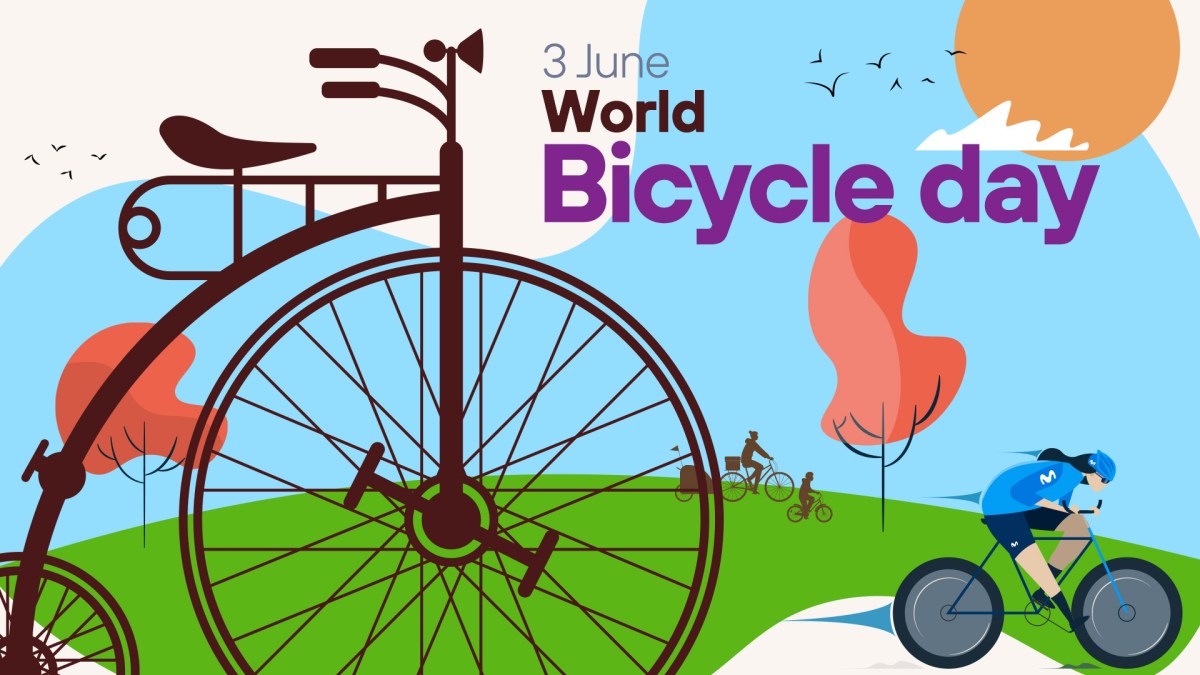Origin of Bicycle Day
Since 2018, when it was approved by the UN General Assembly, one of the main bodies of the United Nations, every 3 June is celebrated as World Bicycle Day.
In resolution A/RES/72/272 of April of that same year, the supranational organisation recognised ‘the contribution of sport to the achievement of the Millennium Development Goals’ as well as ‘the uniqueness, longevity and versatility of the bicycle, which has been in use for two centuries and is a sustainable, simple, affordable, reliable, clean and environmentally friendly means of transport that contributes to environmental management and benefits health’.
Therefore, in this same document, a call was made to the Member States of the organisation to ‘improve road safety and integrate it into the planning and design of sustainable mobility and transport infrastructure’ as well as to give ‘special attention to the bicycle in intersectoral development strategies and to include it in international, regional, national and subnational development policies and programmes, as appropriate’.
History of the bicycle
More than two centuries ago, in 1817, German baron Karl Von Drais invented a device, later known as ‘La Draisiana’. With two wheels and named a walking machine because it had no pedals, this contraption is considered the precursor of the bicycle.
Years later, in 1839, a Scottish blacksmith named Kirkpatrick Macmillan invented the pedal bicycle, although it had wooden wheels. Three decades later, fellow Scotsman Robert William Thomson added inflatable tyres, which were soon followed by inner tubes.
Also at the end of the 19th century, high-wheel bicycles were popular, although they did not survive the passage of time. In the same historical period at the end of the 19th century, the Englishman John Kemp Starley created the ‘safety bicycle’, which already included brakes and two wheels of similar size, giving the invention greater stability.
This device was already much more similar in appearance to the bicycles we know today, although in the last hundred years there have been enormous advances in terms of weight, sophistication, etc., and there are now many different models depending on their use, such as the well-known city bikes, road bikes, track bikes and mountain bikes, and even electric bikes.
As we can see, and as with many other inventions, attributing the original authorship to a single person is not easy.
Benefits of cycling
On Bicycle Day, the UN reminds us that ‘moderate-intensity physical activity, such as walking, cycling or playing sports, has great health benefits’.
The organisation includes other advantages of active transport, including cycling, whose improvement ‘is not (…) just a matter of health’ but “can also lead to greater equity and cost-effectiveness.
Furthermore, cycling and sustainable development are linked, as this mode of transport ‘contributes to cleaner air and less congestion and makes education, healthcare and other social services more accessible to the most vulnerable populations’.
Movistar Team, a benchmark in cycling
Telefónica has strong links to the world of cycling through its sponsorship of the Movistar Team, a team with 45 years of history and more than 1,100 victories among its professional teams, which has been sporting the telephone operator’s brand for the last 15 seasons.
In these 15 years of joint adventure, not including the 2025 competition, the “telephone” team has accumulated four and a half million kilometres in four thousand days of competition across the globe.
Movistar is a brand strongly associated with cycling, among other things for its promotion of professional sport and as a means of sustainable transport and a symbol of a healthy lifestyle.
Since its inception in the 2011 season, the Movistar Team has racked up a large number of victories, including three Grand Tours by some of its riders: La Vuelta and the Giro d’Italia by Nairo Quintana in 2016 and 2014, respectively, and the Italian race by Richard Carapaz in 2019, as well as two road world championships: Rui Costa in 2013 and Alejandro Valverde in 2018.
The men’s team also ranked first in the team rankings for four consecutive years, between 2013 and 2016.
Another major milestone for the Movistar Team came in 2022, when Dutch rider Annemiek van Vleuten made history by winning the road world championship and the three grand tours in the same year: the Tour, the Giro and the Vuelta, a competition in which she won every edition she competed in wearing the Movistar Team jersey between 2021 and 2023.







